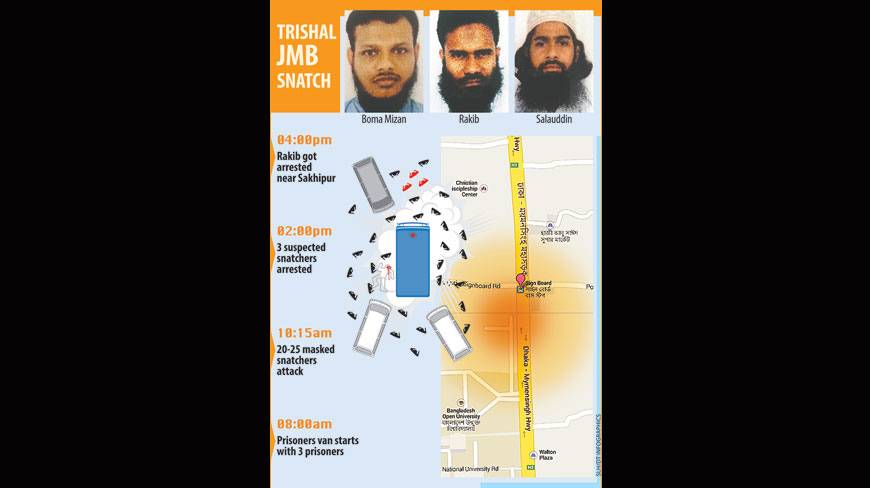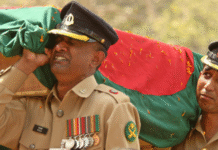The three detained militants, who were snatched from a prison van yesterday by their followers, played key roles in the growth and terror operations of banned Islamist outfits Jama’atul Mujahideen Bangladesh (JMB) and Jagrata Muslim Janata Bangladesh (JMJB).
Of the three, Salahiddin alias Salehin and Mohammad Rakib Hasan Russell alias Hafez Mahmud featured in the seven-member Majlis-e-Shura – the highest policymaking body – of JMB. All five of the other policymakers of the party, including Abdur Rahman and Siddiqul Islam alias Bangla Bhai, have been executed on charges of militancy.
Mizanur Rahman Mizan alias Boma Mizan, who also escaped yesterday, was an explosives expert of the outfit.
Law enforcers held Hafez Mahmud on February 28, 2006, from near the Baitul Mukarram Mosque in the capital. Salahuddin was picked up on April 26, 2006, from Chittagong. Following several years’ of hunting down, “Boma Mizan” was captured on May 14, 2009, from the capital’s Mirpur area.
Hafez Mahmud went to Afghanistan to take part in fights with the militants. Until his arrest, he had been working as the JMB divisional commander of Khulna. Salahuddin, meanwhile, was responsible for looking after the outfit’sfunctions and operations in the Sylhet-Mymensingh region.
Boma Mizan, who came to the law enforcers’ radar after JMB conducted the countrywide serial bomb blasts on August 17, 2005. Notorious militant leaders Abdur Rahman and Siddiqul Islam alias Bangla Bhai, who were executed in 2007 for killing two judges, were the top leaders of both JMB and JMJB. Both the groups were outlawed after the serial blasts.
According to the intelligence unit of RAB, Mizanhe had long been working as an explosives expert for JMB. “Boma Mizan, who was a student of the Dhaka Polytechnic Institute, used to get literature about making bombs and handmade grenades from JMB’s IT [Information Technology] boss Emranul Haque alias Rajib, a Buet graduate.”
Mizan joined JMB as a full-timer in 2001 and soon became a close aide to militant kingpins Abdur Rahman and Bangla Bhai.He told press after his arrest that he had never exploded bombs; he rather trained others to make bombs and grenades.
Some of those who interrogated Mizan in custody, told this reporter that Mizan and some other JMB and JMJB operatives took training from the Rohingya Solidarity Organisation (RSO), an insurgent group based in the Arakan state of Myanmar.
Mizan told the interrogators that JMB maintained close links with RSO. He and some other JMB operatives received training from the RSO arms experts in a camp near the Myanmar border in 2002.
Harkat-ul-Jihad-al Islami (Huji) Bangladesh, another outlawed Islamist outfit comprising Afghan war veterans of Bangladeshi origin, also had strong ties with the RSO.
According to what Mizan told the interrogators, RSO had conducted arms training in camps in the remote hills of Chittagong.
During encounters with some former Huji men, this correspondent learnt that in the late 1980s and 1990s, many Huji operatives took training from the Rohingya rebels. They said the RSO men trained the Huji operatives in makeshift camps set up inside the deep forests of Chittagong Hill Tracts.
They also said RSO helped Huji with weapons and also with funds. The Rohingya group had extensive supplies of arms, and for funds it would count on a number of Muslim-majority countries, especially those in the Middle East.
This correspondent interviewed Abdur Rahman and Bangla Bhai in May 2004 in Rajshahi when they were carrying out terrorist acts under the cover of JMJB. Salahuddin alias Salehin was also present with the two kingpins. They said their ultimate goal was to establish Shariah law through Jihad.
These operatives of JMB launched their operation in Rajshahi region with the help of the administration during the then BNP-Jamaat led alliance government and claimed the aim was to combat left leaning extremists.
JMB kept on operating as a militant and terrorist organization until the 90s. Abdur Rahman, Bangla Bhai and many of their leaders and operatives claimed that they were involved with the politics of Jamaat-e-Islami and its student wing Islami Chhatra Shibir. They said they left the party after Jamaat formed the alliance with BNP because they could not stay under a woman’s leadership.
In 2006, Abdur Rahman confessed to interrogators that he had given the orders for bomb blasts in three cinema halls in Mymensingh in December 2002. Before that, another detained JMB operative Moinul Islam Ranga told a court that Salahuddin had led the attacks.
According to the 2010 report of the International Crisis Group: “Other ICS [Islami Chhatra Shibir] men turned to JMB, including former shura leaders Hafez Mahmud and Salahuddin alias Salehin, citing similar reasons.”
The report said Hafez Mahmud had undergone 12 months of training with an unknown militant organisation in India in 1997. As a founder policymaker of JMB, Hafez recruited and trained up manyoperatives.
Source: Dhaka Tribune










